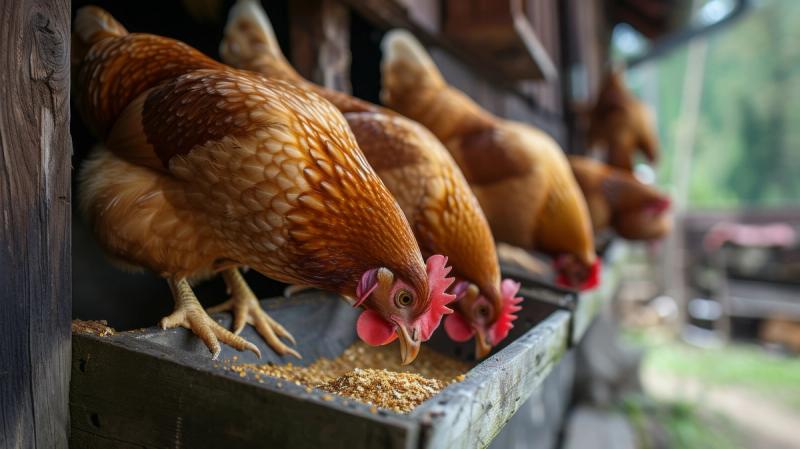Good Nutrition Means Healthy Birds
Chicken Keepers Need a Healthy Flock Checklist


You don’t always acquire healthy chickens. Even when you purchase birds locally from your favorite feed store, they may show signs of disease after being at your home for a few weeks. Offering supplements that help with gut health and feeding a quality diet helps set your birds up for success the first few days after they arrive.
Supplements Help Your Chickens Resist Disease
Like all livestock, animals experience stress for several reasons, and with chickens, this may be due to overcrowding, extreme heat and nutritionally imbalanced feed. Healthy chickens shouldn’t be showing stress behaviors and every chicken keeper needs to know the subtle signs of a sick bird but also a picture of robust poultry health. A healthy chicken exhibits a vibrant and vigorous appearance, characterized by bright eyes, clean feathers and active behavior.
Healthy Chicken Checklist
It is important to know what a healthy chicken looks like and how it typically behaves. As chickens are stoic, watching a flock pick up on certain behaviors can take months and sometimes years. A healthy chicken will be busy unless it’s sunbathing!
There are specific physical characteristics on a healthy chicken checklist:
- Bright, active birds with good posture.
- Bright, bold eyes.
- Legs should be smooth, and scales shouldn’t look rough.
- The comb should be a bright color and purple can indicate there is a problem.
- The nostrils shouldn’t show any signs of mucus.
Good Nutrition Means Healthy Chickens
It’s easy to increase the quality of your feed — an improperly balanced diet results in poorly laying hens. What’s important to know is that a chicken’s nutritional requirements change with age and season. Experts say more than 36 nutrients have been identified as essential to chickens, and water is the most important.
Fresh water should be provided at all times. Raising it off the ground will help a poultry waterer stay clean. Chickens also prefer cold water. Hens will drink less if the water is warmer than 55 F. The average layer also drinks twice as much as the nonlayer.
Chicken Feed Is Readily Available
Don’t attempt a home-mixed ration — it’s a complex undertaking. Commercial feeds are formulated according to age, including grower, developer and layer rations. Chick starter is another option for new chicks. Consider your flock and their approximate age, size, weight and rate of lay. A commercial feed is the easiest way to provide a balanced diet.

Always store your feed in the bag and place it in a cool, dry place away from direct sunlight. Also, your flock’s energy needs vary with the temperature! Adjust down in the summer and upward in the colder months. Increasing nutritional energy with protein and carbohydrates is useful in the winter. Avoid obesity, or you’ll have poor layers.
Recommended Supplements
Some feed stores will educate chicken keepers about the necessary supplements, but it may depend on the chicken’s environment. If your birds are free range and get animal protein from nature through bugs and worms, the supplements you should have on hand may vary, but they will ensure you have healthy chickens.
- The gizzard: Hens don’t have teeth! Grit assists in the grinding process and should be provided in open containers so birds can use it when needed.
- Gut health: Probiotics help support a chicken’s digestive tract. They support a diverse group of beneficial bacteria that support your bird’s immune system.
- Natural supplements: Herbs can be added to nesting boxes and sprinkled directly into feed. Some herbs act as natural antibiotics and others can be used as calming aids during stressful events like fireworks.
- Vitamins: Vitamins derived from plants or animals are needed in small quantities. Giving your birds a vitamin-mineral supplement will boost their immunity.
Gut Health Plays a Big Role
Dr. Xiaolun Sun, associate professor of poultry science at the University of Arkansas, told Chicken Whisperer Magazine that the gut is a highly specialized organ system responsible for nutrient digestion and absorption, regulating energy homeostasis, immune system maturation and defense against harmful substances (e.g., virus, bacteria, parasite, allergen).
“Gut disease disrupts the gut organ system and impairs whole body homeostasis in areas such as nutrient balance and inflammation areas. Because of the high productivity of modern poultry, the birds are very sensitive to deviation of gut health.”
Normal feed consumption and the absence of diarrhea are the key indicators of a healthy gut.
“There are many gut diseases (enteritis) with clinical or subclinical signs, including coccidiosis and necrotic enteritis. Depending on which pathogen causes the gut disease, the enteritis signs are often different. For example, clinical necrotic enteritis birds show sudden death, a decreased appetite, severe depression, watery to bloody (dark) diarrhea, closed eyes, and ruffled feathers. If gut disease signs are observed, it is better to contact a veterinarian for diagnosis and treatment options,” Sun added.
The Role of the Microbiome
The gut microbiome is vital in food metabolism, fat and vitamin production, and is a pathogen defense. A healthy microbiome supports immune function and prevents pathogenic overgrowth.
“The poultry body, particularly gastrointestinal tract, inhabits trillions of diverse microbes including bacteria, archaea, virus, and eukarya. These microbes and their metabolic activities are collectively called microbiome or microbiota. The colonization of gut microbiota effectively inhibits the colonization and excessive growth of potential pathogenic microbes, which is called colonization resistance,” Sun said.
Chicken keepers should feed appropriate supplements to support gut health and a nutritionally balanced diet. The formula for the feed will depend on your chicken’s age, size, weight and overall flock needs. Some birds may enjoy pellets and others may prefer a mash diet. It will take some trial and error before you determine what your birds enjoy eating and what containers they’ll eat out of daily.
Be patient! Your birds will communicate with you and tell you what is and isn’t working.
Tags:Chicken Scratch

Chicken Whisperer is part of the Catalyst Communications Network publication family.











